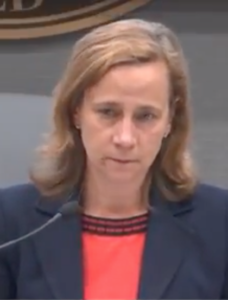Despite staunch and consistent opposition of student representatives from the city’s high schools, the Manchester Board of School Committee voted to add student representatives to their ranks, bringing to a conclusion a more than four year odyssey that pit students from the Granite State Organizing Project’s YOU group against the overwhelming majority of students who actually represented their high schools before the board. The linked to article documents well the student opposition that was presented both at the Policy Committee and at the board. What it doesn’t document are the answers consistently given by students from every high school during the last term when asked, by then Vice-Chairman Arthur Beaudry (D-Ward 9) whether or not they would prefer “a seat on the board” to the current system that provided each school with a place on the agenda to update the board on their school and raise their concerns. Every student from every school preferred the system the prior board had created to having a seat on the board.
The linked to article documents well that the only student group in favor of a student seat on the board was the “progressive” YOU group from GSOP, a leftist activist group that has persuaded their membership, consisting exclusively of students of color, especially refugees and immigrants, that the school system is racist and they’re victims of it. (Hell of a thing to tell refugees and immigrants about the country and community that took them in, don’t you think?). YOU opposed the election of representatives because, as said by several in public meetings, they (YOU members) “weren’t popular” at their schools and wouldn’t win.
All of that said, the point of this article is to assert that it is not legal for the board to seat a student representative. In short the state laws providing such representation simply don’t apply and city solicitors prior to the election of Mayor Joyce Craig, who enjoys strong support from GSOP and its YOU group, rightly said as much.
Supporters of this action, including Craig, disgraced former board member David Scannell (D-Ward 2), and City Solicitor Emily Gray Rice, at Craig’s behest, cite RSA 189:1-c, Student Member, which states:
In addition to the school board members authorized in RSA 671:4, the members of the school board may choose by a simple majority to add one or more nonvoting student members from a high school within its district to the board. The powers and duties of a student member shall be as described in RSA 194:23-f. In districts having more than one public high school, the school board may rotate the student member representation as determined by the board. Italic emphasis added.
Source. 1983, 111:2, eff. July 24, 1983. 2009, 5:1, eff. June 16, 2009.
and RSA 194:23-f, High School Student as School Board Member, which provides:
The provisions of this section shall apply only to high schools located in a school district in which the school board has voted to have a nonvoting student member pursuant to RSA 189:1-c.
I. In addition to the school board members authorized in RSA 671:4, a high school shall select, in accordance with the directives of paragraph II and the provisions of RSA 189:1-c, one or more students from among its members to be nonvoting members of the school board for the district in which the high school is located. A student member shall have all the rights of a regular school board member regarding school board business except the right to vote.
II. A student board member shall be chosen by a simple majority vote of the high school student body. The student government of the high school shall establish procedures for the nomination and election of candidates. The student government shall also establish a procedure for any public high school student in the school district to petition a student board member to present proposals and opinions to the school board.
III. A student board member shall serve for a term of one year. The school board shall decide the date at which the term shall begin. Any student who will graduate during the term’s duration is not eligible to be a candidate and is not eligible to vote. The student government of the high school shall establish a procedure for filling any vacancy that may occur in this position. A student board member shall serve without pay.
IV. The duties of a student school board member shall include:
(a) Attending all school board meetings except as specified in paragraph V;
(b) Representing all public high school students within the district;
(c) Presenting to the school board specific proposals and opinions from students as directed in paragraph II; and, when appropriate, placing proposals on the school board agenda in accordance with the board procedures;
(d) Serving as a liaison between students and the principal, other faculty, student government advisors, and appropriate outside agencies;
(e) Keeping public high school students informed of the business of the school board.V. A student school board member shall be excluded from discussions and procedures of the school board involving subjects which are confidential under RSA 91-A.
Source. 1983, 111:3, eff. July 24, 1983. 2009, 5:2, eff. June 16, 2009.
At first blush, the policy adopted by the board does appear to meet the mandates of both statutes. However, that is not the issue. The issue is whether or not the statutes apply to the city. In order to determine that, one has to read and assess ALL of the laws referenced in these statutes. RSAs 189:1-c and 194:23-f are easy enough. They reference each other. The consequential statute, referenced by both, however, is RSA 671:4, reference to which is noticeably missing from Solicitor Rice’s “legal” opinion. RSA 671:4 Board states:
A school district which is not a cooperative school district as defined in RSA 195:1 may have a school board of 3, 5, 7, or 9 members, as it shall determine by vote at any annual meeting. They shall serve for a term of 3 years. Insofar as possible, an equal number of the members shall be elected at each school district election. Whenever such a district determines to change the number of board members, it shall also determine the number of members to be elected each year. Such change shall not take effect until the school district election in the year next following the one in which the change is voted. The board will increase or decrease in membership so that there will always be an uneven number of members until the desired number is reached. The school board of a district which does not otherwise vote shall have 3 members. All emphasis added.
Source. 1979, 321:1, eff. Aug. 21, 1979.
Manchester’s school board does not comply with ANY of these statutory provisions. Not one. The reason for that is the city’s charter determines the board’s number, term and election cycle. The charter, by the way, IS state law. Since Solicitor Rice and the supporters of this proposal state that state law trumps local law, it’s important that the public understand that the city charter IS, in fact, state law. Charter Section 4.02 SCHOOL COMMITTEE establishes the school board thusly:
The School Committee shall be comprised of fourteen (14) members, one each from the twelve wards of the city and two from the city at-large. The school committee shall sit and act together as one body. The mayor shall be an ex-officio member with all the powers and privileges of the other committee members and shall be chairman of the committee.
That brings us to RSA 195:1. This link has been provided rather than take up space here because it provides the definition of “cooperative school district” and Manchester does not meet that definition. Since Manchester doesn’t meet the definition, we’re left to ask whether or not Manchester is covered by RSA 671:4. Clearly, it is not. Therefore, the RSAs enabling students to be seated on school boards around the state simply do not and cannot apply to Manchester. If they did, then the city would also be bound by RSA 671:4 and the charter provision determining the school board’s membership and terms would be completely null and void with Manchester having a board that reflected the requirements of the statute.
During the meeting, Committeeman Beaudry raised these points. The district’s attorney is supposed to research the matter and get back to the board. Once she does, we’ll know whether or not she’s worth the large salary she receives or she’s going to provide, as Solicitor Rice did, a purely political opinion that completely ignores the relevant state law to placate a political organization with a race based agenda determined to paint the district as racist, with the willing help of its supporters on the board.












